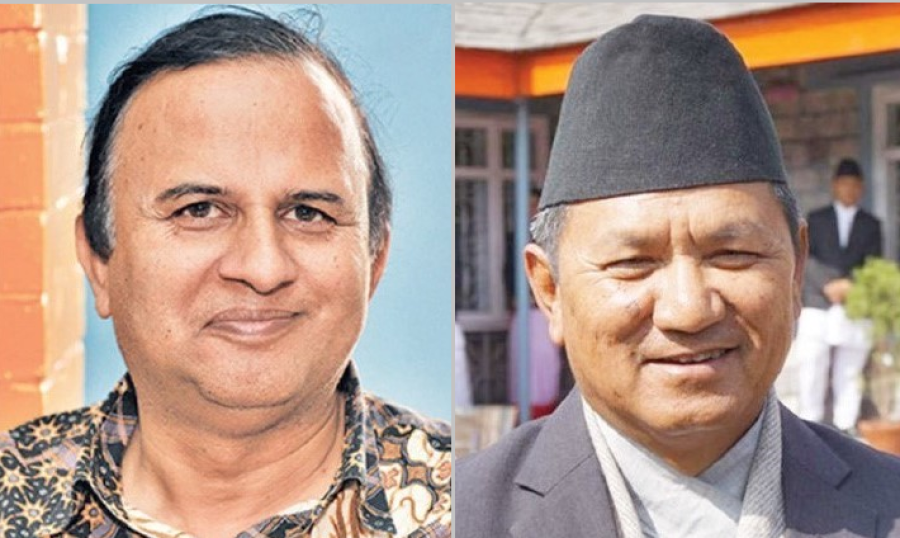Politics
As chief ministers go troubleshooting for Oli, provincial governance takes hit
Every time prime minister faces trouble in the Nepal Communist Party, Pokharel and Gurung rush to Kathmandu. They are now at the forefront of efforts to save the party.
Binod Ghimire
Prithvi Subba Gurung, chief minister of Gandaki Province, had a pre-scheduled plan to inaugurate a drinking water project in Syangja on Saturday. The plan, however, was postponed as he had to rush to Kathmandu to make a last ditch effort to keep the Nepal Communist Party intact.
He left Pokhara on Friday evening, a few hours after the Pushpa Kamal Dahal and Madhav Kumar Nepal led-faction of the Nepal Communist Party elected Dahal as the party’s parliamentary party leader.
Gurung, who is close to Oli, had been in Kathmandu two weeks back too when he held meetings with the second rung leaders of the Dahal-Nepal faction of the party as an attempt to find ways to avoid a party split. He had returned to his duty station after a series of meetings.
Before Gurung landed in the federal Capital, Shankar Pokharel, chief minister of Lumbini Province, was in Kathmandu holding talks with the second rung leaders from the Dahal-Nepal faction.
Though he returned back to Butwal on Thursday evening after a couple of days, Pokharel might come again in a couple days, according to his personal aide.
Pokharel, who is a close confidant of Oli, rushes to Kathmandu, whenever the party or Oli is in trouble. On several occasions, in the past, Pokharel together with other leaders from the party including Gurung, have stopped the Nepal Communist Party from splitting.
As the party, which has split politically, is still intact legally, Pokharel and Gurung, Standing Committee members from Oli the camp, have been making last minute efforts to save party unity. It’s been over a year since the Nepal Communist Party started facing trouble and been on the verge of a split. Each time a split was averted as the leaders from both the Oli and Dahal-Nepal sides found a temporary way out to save the party. Pokharel and Gurung have played instrumental roles on every such occasion.
In the last one year both the leaders have come to Kathmandu at least over a dozen of times mainly to back up Oli in the party meetings and to work towards bridging differences within the party.
Pokharel was elected as the secretary of the CPN-UML in the eighth general convention in 2010. He, however, was defeated by Ghanshyam Bhusal as the party’s deputy general secretary from the ninth general convention held in 2014. Gurung was elected secretary of the UML from the ninth general convention.
Political experts say in a parliamentary democracy the party leaders are the one who are elected in the executive, therefore, it is natural for them to be involved in the party activities.
However, there are limitations, they say.
According to Lok Raj Baral, professor of Political Science at Tribhuvan University, when Pokharel and Gurung took the office of chief ministers, their primary responsibility became performing their assigned jobs.
“However, they are equally busy in managing party activities in Kathmandu,” he told the Post.
Both Gurung and Pokharel are ambitious leaders aspiring for leadership positions in the party in future. They are also considered studious and the administratively able leaders.
According to an aide to Gurung, given his position in the party it is natural for him to divide his time between Pokhara and Kathmandu.
“He had to move to Kathmandu despite a busy schedule because he also has an important responsibility to save the party,” Bikram Neupane, communication advisor to Gurung, told the Post. “Trouble in the party doesn’t only affect the centre but also the provinces.”
Experts say three years passed the provincial governments came into being but they are still struggling to operate as full-fledged federal units. While it is partially because of the centralised mindset of the federal government, the provincial governments are partially responsible for it, according to them.
Khim Lal Devkota, an expert on federalism and former vice-chair of the provincial planning commission in Bagmati province, said while it was good for the federalism that the leaders of the stature of Pokharel and Gurung are leading the provincial governments, the dual responsibility has affected their performance in the provinces.
“The provinces would definitely have fared better had they focussed themselves as in their job of chief ministers,” said Devkota.
Experts feel that they should dedicate themselves to the party or to governing the provinces.
“They always have an option to give up the chief ministerial position and focus on the party activities,” said Baral. “They should be clear on what they want.”
But on the other hand, they are just following the footsteps of their leader Prime Minister Oli, he said.
“You cannot expect the chief minister to stick in their duty stations when the prime minister of the country doesn’t go to Singhadurbar for months,” Baral said.
Oli entered his office in Singhadurbar after 10 months on February 15 to inaugurate the rebuilt main administrative building of the country which had been destroyed in the 2015 earthquake.




 13.12°C Kathmandu
13.12°C Kathmandu














